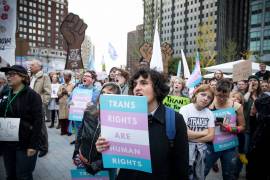Dana — who uses the gender-neutral pronouns “they,” “them” and “their” — was born with ambiguous sex characteristics. Shortly after Dana’s birth, their parents and doctor decided to raise them as a boy. As a result, Dana underwent several irreversible, painful and medically unnecessary surgeries that didn’t work, traumatized Dana and left them with severe scarring.
Dana applied for a passport in 2014, when they were invited to attend the International Intersex Forum in Mexico City. Even though Dana’s birth certificate lists their sex as “unknown,” and the fact that Dana’s doctors with the U.S. Department of Veterans Affairs confirm their gender as intersex, Dana’s application for a passport was denied.
Dana says:
Today’s decision is great news, but I realize it is the first step in a long battle.
Every day, I am forced to suffer the consequences of decisions made for me as a child. I shouldn’t have to suffer at the hands of my government — a government I proudly and willingly served — as well.
It’s a painful hypocrisy that, simply because I refused to lie about my gender on a government document, that the government would ignore who I am. I hope the State Department will do the right thing now.
Several countries currently issue passports with gender markers other than “F” or “M,” including Australia, India, Malta, Nepal and New Zealand. Most countries that offer a third gender marker on their passport use the non-specific “X” because it is recognized by the International Civil Aviation Organization (ICAO), a United Nations agency that sets forth international travel document standards.




